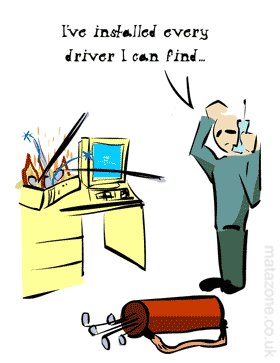This week I managed to pick up The Matrix box-set (UK link ) (US link
) (US link ) for a very good price indeed. I’ve not got the second and third films before, despite really enjoying them, partially because of the price, but also because of the lack of commentaries.
) for a very good price indeed. I’ve not got the second and third films before, despite really enjoying them, partially because of the price, but also because of the lack of commentaries.
I really like director’s commentaries, they really convey a lot about how the creator views their work. John Carpenter tends to give terrible commentaries that are nonetheless quite entertaining, the Lord of the Rings commentaries are very good… Anyway, a good one will usually give you some insight into the ideas that a director was working with.
For the Matrix films the Wachowski brothers in the box-set didn’t do the commentaries themselves, instead they get two philosophers (who like the films) and three film critics (who don’t) to do two commentaries. Their reasoning for this was to give a balance of interpretation. They say that when they talk to people about what they think that the films mean that those people then accept that interpretation unquestioningly. Maybe that is the case for most people, but not for an academic.
Why should the creator have any more of a valid view of their art than a theorist? Certainly they know what they were intending to do, but art is an act that manifests itself through the expression of countless levels of the conscious and unconscious mind. It may be that the imagery that gives a painting, film, music, or game such cultural resonance is something that the artist only casually included as background detail or for the sake of style.
For example, next time you watch the Charlie’s Angels movie (UK link ) (US link
) (US link ), look at the use of rubber, shiny outfits, and blood. Rubber and reflective black materials are associated through Freudian symbolism with the eroticised feminine, specifically excited reproductive organs. Blood carries similar symbolism, indicating menstruation. Now look at the film and watch the points at which the bad guys are defeated. Their outfits become dusty or they have only at that last moment begun to bleed. For a film that is supposedly about feminine empowerment it seems odd that it is at the point of indication for barren femininity or extreme feminisation that the characters become vulnerable, suggesting that the apparent feminist discourse is undermined by a wider patriarchal symbolic structure.
), look at the use of rubber, shiny outfits, and blood. Rubber and reflective black materials are associated through Freudian symbolism with the eroticised feminine, specifically excited reproductive organs. Blood carries similar symbolism, indicating menstruation. Now look at the film and watch the points at which the bad guys are defeated. Their outfits become dusty or they have only at that last moment begun to bleed. For a film that is supposedly about feminine empowerment it seems odd that it is at the point of indication for barren femininity or extreme feminisation that the characters become vulnerable, suggesting that the apparent feminist discourse is undermined by a wider patriarchal symbolic structure.
It’s highly unlikely that was intended and the director would most likely tell you that it’s not there, but that doesn’t mean that it’s not a valid view. I would have loved to have heard what the Wachowski brothers thought they were doing so I could compare it with my own ideas of the cultural resonance of their imagery, but instead we get the interesting, but distanced, views of philosophers, and the babble of film-critics who demonstrate how jaded they have become with things that are just fun (it might sound like I’m saying they’re jaded just because I like the films, but try listening to them and see if you don’t think it too!).
What’s the difference between a cliché and a knowing observation of filmic principles? It’s all a matter of perspective really, so I just wish we could have heard what the brothers would have said, because at least that would have given us the opportunity to ignore them if we wished, rather than currently where we don’t have that choice.

